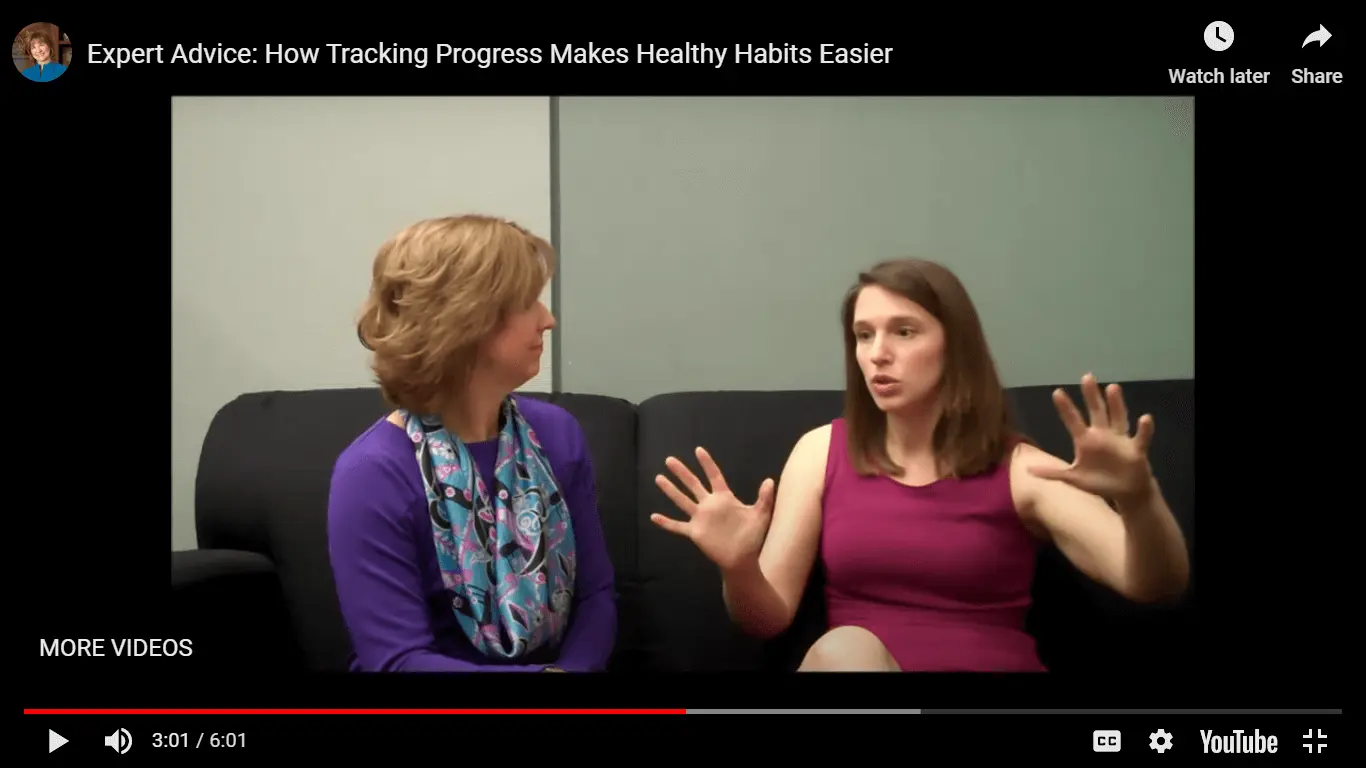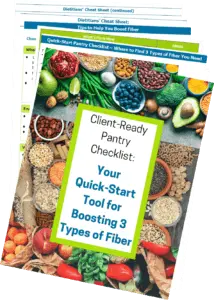
How to Get a Handle on Healthy Habits: The Research
Inside: Healthy habits don’t just happen. Research has identified things you can do to make creating and keeping new habits easier and more successful. Here, learn about one of those techniques, and get practical steps to put it in practice.
“Ultimately, people do not decide their future. They decide their habits, and their habits decide their future.” So says John C. Maxwell in The 15 Invaluable Laws of Growth: Live Them and Reach Your Potential, a book I’m on my third time through as an audio book to accompany me on walks.
Ah, you say, but where do those habits come from? Do health-promoting habits seem hard to establish and easy to lose, while it’s amazingly easy to fall back into unhealthy habits?
Here, in Part 1 of a series, Rebecca Krukowski, PhD, provides perspective on how “self-monitoring” can play a role in creating healthy habits. Dr. Krukowski is a clinical psychologist and Assistant Professor in the Department of Preventive Medicine at the University of Tennessee Health Science Center in Memphis, where she conducts research on behavior-change interventions for weight loss.
Following the video, read on for practical take-home tips on different options for using self-monitoring to help you create habits to lose weight or achieve other health goals – or to avoid the all-too-easy path back to unhealthy habits in the months ahead.
“Self-monitoring” may sound like a hard-line, scientific task. It can be. Outside of a research study, for your real life efforts at creating a healthy lifestyle, think of it simply as tracking.
Keeping track of the choices you make or the goals you seek can be the “secret sauce” providing an extra oomph to help you over the hurdles to healthier habits.
What Help Do You Most Need for Sticking with Healthy Habits?
Knowing what kind of help you’re seeking may help you decide what choices for self-monitoring can best meet your needs.
Self-monitoring – keeping track of what you do or the results you get – can be a powerful tool for:
- Awareness – In the rush of daily life, eating and lifestyle choices we make can go completely unnoticed. Keeping track of what you eat can draw attention to how often you snack and what tends to prompt it, whether your portion sizes and second portion habits are what you think, how much time you actually spend watching TV or surfing the net, whether eating out really is your downfall, or how much sleep you get. Depending on what you want to learn, you might track what you eat and drink, the calories or sodium content of those choices (to see if the problem areas are what you think they are), or what situations tend to make healthy choices easier or harder.
- Balancing – Tracking what you eat and drink, as well as how the calories, sodium or fiber in your choices add up, can help you identify trades and swaps that make sense in your life. If you feel you have no time to walk or get the sleep you need, tracking time spent on something else may help you identify options to create time for what you want to do.
- Problem-solving— Rather than using the information you collect to bury yourself in self-criticism, use it to identify specific barriers or situations for which you want to try alternative solutions. For example, is your mid-afternoon snack that’s adding so many extra calories stemming from hunger (you need new ideas for a more sustaining lunch), stress (you need alternate ways to respond), or lack of healthful options (you need ideas for snacks you can bring with you or keep on hand)? Switch your focus to finding solutions to the problems you uncover.
- Accountability – We can tell ourselves “I don’t eat that much” or “I take a walk when I can”, but seeing the choices we’ve made or their outcome spelled out can provide a needed reality check. Perhaps becoming accountable to yourself is the change you need; perhaps sharing the information you track with a supportive family member, friend or health professional will add motivation or provide the honest feedback you need.
- Reinforcement – Do you remember every extra bite or unhealthy choice you’ve made and overlook the progress you make? That’s a mindset that can turn against you, digging you into a view of yourself as unable to create and keep a healthy lifestyle. Keeping track of small successes, each one too small on its own to bring the results you seek, can encourage more small steps that add up to make a difference.
What Should You Track to Support Healthy Habits?
As Dr. Krukowski discussed in our video interview, you might choose to track your behavior choices or the outcomes of those choices and progress toward the goal you seek.
You Can Track Behaviors
- Food records: what you eat and drink all day and in what portions, what choices you make at specific times of day or situations, or the quality of those choices (calories, saturated fat or vegetable servings, for example).
- Physical activity records: step counts from a pedometer or other activity tracker, minutes spent walking each day, time spent in a particular form of inactivity, or how many times you made the choice to take the stairs.
- Sleep records: total hours slept, or how well you met a goal of going to bed or getting up by a particular time.
You Can Track Outcomes
- Weight
- Waist size
- Percent body fat and lean mass
- Blood pressure
- Blood sugar
What’s the Best Way to Track Your Habits? The One that Works for You
In the Resources section below, you’ll find links to a variety of options for how to use tracking to help you establish healthy habits. Whether you prefer paper charts you post on your refrigerator or near your bathroom mirror, or electronic forms using your computer or cell phone, what’s “best” is what works for you. Experiment with different options until you find what helps you most.
Sometimes the simple act of keeping track of behavior choices makes an amazing difference in helping you change. Going a step further in an upcoming research review, we’ll look at how the way you use self-monitoring can change the benefits you experience.
Resources to Help You Track Healthy Habits
Here are a few examples of options for tracking eating, activity, sleep or weight through websites or apps. Including these specific examples is not an endorsement of them, and none have paid or requested to be listed. Of the many options available, this is simply a sampling of some that registered dietitian nutritionists have reviewed positively and that I’ve found helpful for clients, friends or myself.
Start Simple with MyPlate by USDA – an app that helps you set practical, attainable goals and track your progress toward the eating habits recommended on the MyPlate.gov website. You can download the free Start Simple with MyPlate app on a computer or through a smart phone here: https://www.myplate.gov/resources/tools/startsimple-myplate-app. The MyPlate website resources page also offers a free tool to create a personalized plan for healthy eating, and it’s available in both English and Spanish.
Calorie Counter & Diet Tracker by MyFitness Pal – track food and activity, check progress and see how you meet nutrient needs. Available from your computer at https://www.myfitnesspal.com/ and as an app with smart phones and tablets. You can scan barcodes from food labels to make tracking easier and save meals and recipes you use often. You can sync with fitness/exercise trackers data, too.
Lose it! by FitNow, Inc. – The free version, tracking calories, exercise, and weight, is all many people need. Access from your computer at https://www.loseit.com/ or through apps, which provide a barcode scanner option. Premium paid subscription lets you track carbohydrates, protein, fat, sodium and fiber, as well as waist and other body measurements, and sync with a broader range of fitness trackers for following your activity habits.
Bottom Line on Tracking Your Choices to Support Healthy Habits
Creating healthy habits and maintaining them as a lifestyle takes more than motivation and knowledge. Focus on small achievable steps you can take daily. They will add up. Moreover, research shows that for many people, adding some form of tracking can help take this challenge “from daunting to doable”.
Come back for more with Dr. Krukowski about what research suggests on the question of how often to weigh yourself, and how to choose among different options for tracking your habits or progress toward goals.
Meanwhile, if you find this info helpful, please share it on your favorite social media channel or by emailing a link to a friend or colleague.
If you aren’t already receiving my research updates by email, sign up so you don’t miss what’s next.
Just click here!
Published : November 3, 2015 | Last Updated: February 1, 2022
Tagged: apps, behavior change, healthy diet, healthy eating, healthy habits, healthy lifestyle, heart health, Rebecca Krukowski, reducing cancer risk, researcher interviews, self-monitoring, tracking, video interview, weight control, weight loss
Meet the author/educator
I Take Nutrition Science From Daunting to Doable.™
As a registered dietitian nutritionist, one of the most frequent complaints I hear from people — including health professionals — is that they are overwhelmed by the volume of sometimes-conflicting nutrition information.
I believe that when you turn nutrition from daunting to doable, you can transform people's lives.
Accurately translating nutrition science takes training, time and practice. Dietitians have the essential training and knowledge, but there’s only so much time in a day. I delight in helping them conquer “nutrition overwhelm” so they can feel capable and confident as they help others thrive.
I'm a speaker, writer, and nutrition consultant ... and I welcome you to share or comment on posts as part of this community!


